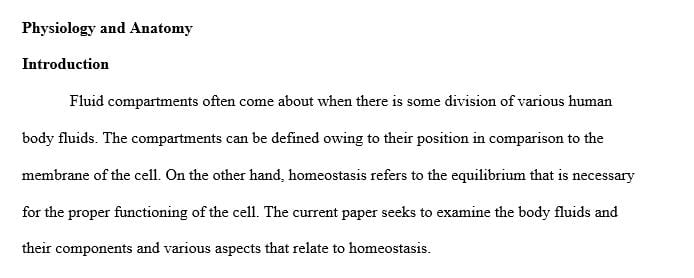Explain the basic concepts involved in fluid and electrolyte regulation
H05 Anatomy & Physiology II
Directions: Be sure to save an electronic copy of your answer before submitting it to Ashworth College for grading. Unless otherwise stated, answer in complete sentences, and be sure to use correct English, spelling and grammar. Sources must be cited in APA format. Your response should be four (4) double-spaced pages; refer to the “Assignment Format” page located on the Course Home page for specific format requirements.
After completing this assignment you will be able to:
Explain the basic concepts involved in fluid and electrolyte regulation
Explain the different buffering systems of the intracellular and extracellular fluid
Understand how homeostasis may be disrupted if the appropriate balance of body fluids is not maintained
Describe the differences between intracellular fluid (ICF) and extracellular fluid (ECF) including:
Location in the body
Characteristic ions
Sodium and potassium are the largest contributors to electrolyte balance in the body. Describe one (1) way in which they each participates in electrolyte balance in the body.
The composition of body fluids is extremely important to maintaining homeostasis in the body. Discuss three (3) ways that homeostasis may be disrupted if the appropriate electrolyte levels and pH of body fluids are not maintained. Describe two (2) solutions that are available to return the body to homeostasis.
Grading Rubric
Please refer to the rubric on the following page for the grading criteria for this assignment.
Answer preview to explain the basic concepts involved in fluid and electrolyte regulation


